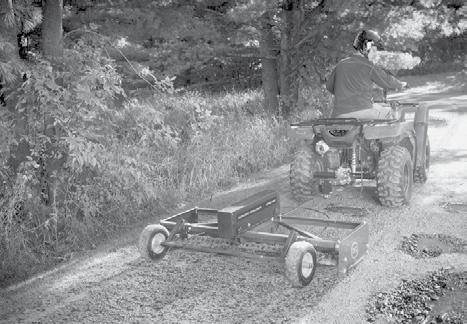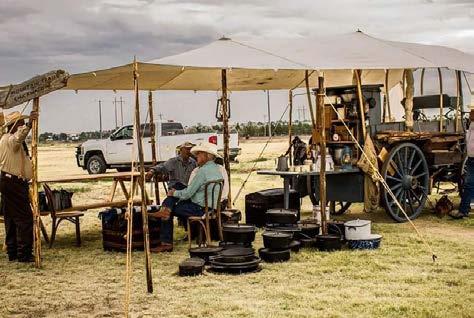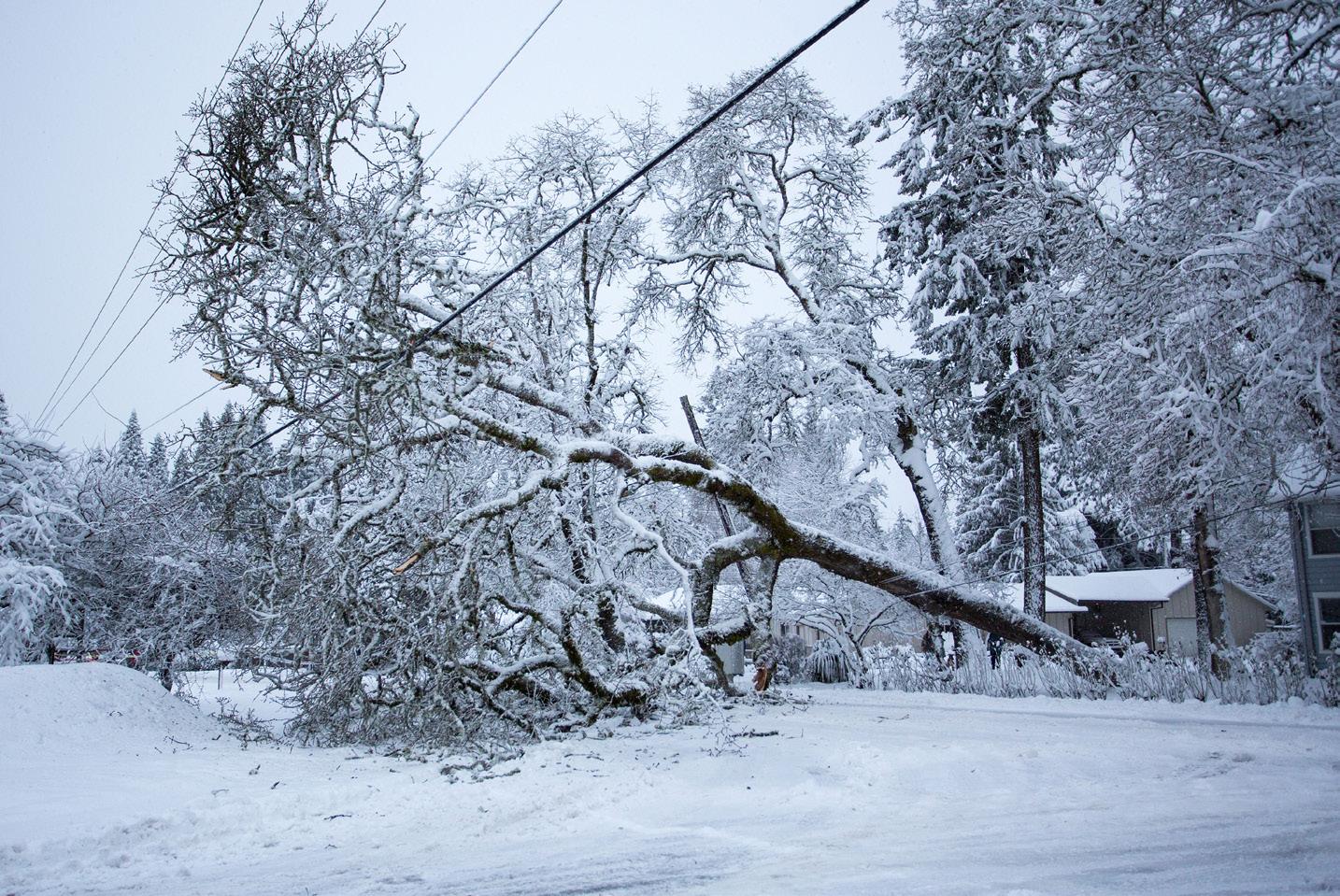
22 minute read
A RESPONSIBLE ENERGY PLAN
A RESPONSIBLE ENERGY PLAN Transition to greener power underway for co-op power supplier
BY KENT SINGER EXECUTIVE DIRECTOR
In January, Tri-State Generation and Transmission Association (a member of the Colorado Rural Electric Association) announced that over the next 10 years it will retire its coal-fired power plants in Colorado and replace those sources of electricity generation with wind and solar power. By the end of 2030, Tri-State will no longer operate any coal-fired plants in Colorado, thus reducing the company’s carbon emissions from its Colorado plants by 90% and reducing carbon emissions from all electric sales in Colorado by 70%. (Tri-State will continue to import some coal-fired power from sources outside of Colorado.)
This is an historic decision by Tri-State, which provides wholesale power supply to every Colorado electric distribution co-op except Grand Valley Power, Yampa Valley Electric Association, Holy Cross Energy and Intermountain Rural Electric Association. Along with the announcement of the coal plant retirements, Tri-State announced the addition of nearly 1 gigawatt (1,000 megawatts) of new renewable energy capacity to its generation resources. These new wind and solar projects will be located across Colorado, creating temporary construction jobs as well as permanent maintenance positions. After its Responsible Energy Plan is completed, Tri-State will have more than 2,000 megawatts of renewable energy capacity on its 3,000 megawatt system.
Tri-State’s new direction regarding its power portfolio is driven by several factors. In 2019, the Colorado General Assembly adopted legislation (H.B. 19-1261) that requires significant reductions of greenhouse gas emissions from all industries operating in the state. Although the rules for the implementation of this legislation have not been finalized, it’s clear that electric utilities will be required to reduce their reliance on fossil fuels in the near future. Tri-State’s need to comply with the Colorado law is an important factor in its recent announcements.
But even absent a legislative mandate, the rapidly decreasing costs of renewable energy make those resources more attractive today than they were just a few short years ago. You may recall that, in 2013, Tri-State, along with CREA, opposed Senate Bill 13-252 that increased the renewable energy requirements for Colorado’s electric co-ops. As recently as seven years ago, the cost of renewable energy was significantly higher than it is today and, at that time, we were concerned that a requirement for more renewables would increase rates to co-op consumer-members. With improved technology and economies of scale, wind and solar generating plants today can provide cost-effective energy while at the same time reducing carbon emissions.
Perhaps the most important driver in Tri-State’s course change, however, is the desire by many of Tri-State’s members for the co-op to diversify its power supply and include more renewable energy. Tri-State is owned by its 43 distribution co-op and public power district members who are in turn owned by their consumer-members. One of the key principles of the cooperative business model is “democratic member control” and that means the members at the end of the line have input into Tri-State’s resource decisions. In making these adjustments to its power supply portfolio, Tri-State is also honoring this core co-op principle.
KENT SINGER
This new path for Tri-State does not come without challenges. On the operations side, Tri-State will have to figure out how to best balance its members’ power needs with an ever-increasing array of intermittent generating resources. This may require the deployment of new technologies and operating procedures in order for Tri-State to maintain the same level of reliable power supply that Colorado’s electric co-ops have enjoyed for decades.
More important than the reliability challenges, however, is the impact of Tri-State’s new direction on current Tri-State employees. Several hundred men and women who currently work at the Tri-State coal plants and coal mines that are being retired will be affected by this decision. These are folks who, in many cases, have spent their careers and much of their adult lives serving you, the citizens of rural Colorado. They have done this difficult and sometimes dangerous work so you could have light and power. They did it without asking for recognition or praise, but simply for the satisfaction of helping their communities.
They deserve to be thanked and supported in this time of transition.
Kent Singer is the executive director of the Colorado Rural Electric Association and offers a statewide perspective on issues affecting electric cooperatives. CREA is the trade association for your electric co-op, the 21 other electric co-ops in Colorado and its power supply co-op.
The legacy of Colorado electric co-op heroes FROM THE EDITOR
BY MONA NEELEY EDITOR
This is the Colorado Rural Electric Association’s 75th year of representing Colorado’s electric cooperatives as their statewide trade association. CREA and the co-ops are excited for the next 75 years, but before we move ahead, let’s take a quick look back.
When I was hired back in 1994, there were still CREA board members who remembered the lights coming on, including the late Mick Geesen from Mountain View Electric and the late Ray Macht from La Plata Electric.
Mick was only 21 when he arrived in Colorado in 1941 to start ranching on family land. He moved from an area with electricity and knew what a difference it would make for his home outside of Agate. So, he went to work to sign up enough members that the fledgling local co-op could qualify for a Rural Electrification Administration loan to build its system. And he stayed for
MONA NEELEY 50 years, guiding the local co-op.
R a y w a s another young rancher who saw the benefits of electricity. Pagosa Springs, only 4 miles from his place, had power and when the nearby La Plata Electric bought the city system and started expanding, Ray was ready. He rented equipment and began digging holes for power poles along his driveway and toward town, even using dynamite in the rocky spots.
Ray believed in the rural electric program so much that he immediately got elected to the board and spent the next 50 years helping guide the growing co-op.
These men are just two of so many heroic co-op pioneers. Their legacy is now carried into the future by the dedicated directors serving your electric co-op today.
Mona Neeley is the statewide editor of Colorado Country Life, which is published in coordination with your local electric cooperative.
RULES: Colorado Country Life is looking for pet stories explaining what makes your pet special or what amazing things your pet has done. 1st, 2nd and 3rd place and runners up published in the magazine will be awarded cash. Stories will be published in the September magazine. Rules for the contest are as follows: 1. Story must be told in no more than 300 words. 2. Deadline to enter is May 22. Entry must be received in the office by 4:30 p.m. 3. Entries may be typed or handwritten. 4. Photo of the pet must be included with the entry. If the photo is sent digitally, it must be at least 4X5 inches in size at 300 dpi. 5. Digital entries must be sent to info@coloradocountrylife.org. 6. Mailed entries must be sent to Pet Story Contest, Colorado Country Life, 5400 Washington St., Denver, CO 80216.
Questions may be sent to info@coloradocountrylife.org. LETTERS TO THE EDITOR
Compassion Via a Lightbulb I can’t thank you enough for the inspirational and heartwarming piece about the Colorado and Oklahoma linemen who performed philanthropic work last summer in Guatemala (“Bringing Light, Finding Joy” December ’19). Citizens of Central America and poor nations around the world are often casti gated as being unworthy of the compassion and generosity we take for granted in America. And many Americans have never experienced firsthand the extreme poverty and injustices evident in poor countries around the world.
The article correctly notes that, in spite of unimaginable economic conditions, these citizens are able to find joy and hope in something as simple as a single lightbulb brought into their homes. The 20 lineworkers who participated undoubtedly also discovered joy and hope in their mission, and I’ll bet their lives will forever be changed for the better. Jim Little, Wetmore San Isabel Electric consumer-member
A Lower Carbon Footprint Reading the December issue, [I saw] a picture of former Gov. Bill Ritter and Tri-State Generation and Transmission CEO Duane Highley at the CREA Energy Innovations Summit. I noticed about six plastic bottles of water on a table in front of them. On the next page is an article on co-ops working to lower carbon energy use. Let’s try to use glass or reusable water containers as much as possible and we will work to lower carbon energy use together. M. Cary, Kremmling Mountain Parks Electric consumer-member
More Energy Efficiency The coal plant retirements and new renewable energy projects announced by Tri-State Generation and Transmission are big steps in the right direction. But more should be done if Tri-State is to truly respond to the threat of catastrophic climate change in a responsible manner. In particular, Tri-State should expand the energy efficiency programs it implements together with its member cooperatives. Howard Geller, executive director Southwest Energy Efficiency Project
SEND US YOUR LETTERS
Editor Mona Neeley at 5400 Washington St., Denver, CO 80216 or at mneeley@coloradocountrylife.org. Include full name and contact information.

RENEW Your Driveway...

SAVE MONEY! Loosen and redistribute existing material, instead of purchasing new gravel or stone. CARBIDE TEETH last 10X longer than steel on ordinary box scrapers. TOW BEHIND YOUR ATV, fi lling in potholes & ruts. ... with the amazing DR ® POWER GRADER! 1AD58X © 2020
ALSO GREAT FOR HORSE RINGS, BALL FIELDS, AND PARKING AREAS!
Go Online or Call for FREE Info Kit! FREE SHIPPING 6 MONTH TRIAL SOME LIMITATIONS APPLY

TOLL FREE DRpowergrader.com 877-202-1268
LEGISLATIVE DIRECTORY
Download Our Mobile App for FREE! Stay in touch with Colorado legislators while on the go.
Using the camera on your smartphone, scan this code to get the download link.
iOS App Store
Energy-Saving Landscaping Tips
The decisions you make about your home’s landscaping can help you stay cooler in the summer and warmer in the winter. With summer around the corner, take a look at how strategic planting can help cool your home. Direct sunlight hitting windows is a major contributor to overheating the home during summer months. By planting trees that block sunlight, you can improve comfort and reduce air-conditioning energy use. If the trees eventually grow tall enough to shield the roof, that’s even better.
The most important windows to shade are the ones facing west, followed by windows that face east. Morning and evening sunlight hits the home more directly than midday sunlight. Also, an eave on the south side of the home can help shade windows during midday sun.
If you live in one of Colorado’s cooler areas, planting deciduous trees that lose their leaves in the fall will shield your windows in summer and allow sunlight in during winter to help warm your home. A simple approach that can deliver some shade the first year is to plant a “living wall” of vines grown on a trellis next to the home.
There are two other important factors to consider in some areas of Colorado: 1. Water is becoming more precious and expensive. When you pay your water bill, much of that cost is for the energy required to pump water to your home, or perhaps you have your own well. Either way, reducing water use saves money and reduces energy use. 2. If you live in an area that has wildfires, definitely take it into consideration as you develop a landscaping plan. What and where you plant on your property can either increase or decrease the risk of fire reaching your home. Planting a row of shrubs a foot from the home can provide more efficiency in cooler climates. By stopping air movement, it can form a dead air space around the home that acts as “bonus” insulation.
These are just a few ideas to help you get started. Also remember that, as with any landscaping projects that require digging, it’s important to call 811 to ensure all underground utility lines are properly marked and flagged before you start the work. Happy planting! BY PAT KEEGAN AND BRAD THIESSEN
BY JIM HERRON CEO | HERRONJC@MVEA.ORG T hroughout 2019, we discussed the rapidly evolving energy landscape of Colorado: large-scale policy change driven by the decreasing cost of renewable energy, increasing support for an energy portfolio change by Colorado’s elected officials, the passing of House Bill 19-1261 “A Climate Action Plan To Reduce Pollution,”and the announcement by Tri-State Generation and Transmission Association, Mountain View Electric Association, Inc.’s wholesale power supplier, to create a Responsible Energy Plan to meet regulatory demands. The changes in 2019 were rapid, sweeping, and, at times, surprising. That trend has carried over into 2020. In early January, Tri-State made two announcements that will further transform Colorado’s energy landscape.
The first announcement was that Tri-State will retire all coal generation in New Mexico by the end of 2020 and its remaining Colorado coal plants and coal mine by 2030. According to Tri-State, the closures will result in a 100 percent reduction of coal emissions in Colorado and New Mexico while increasing Tri-State’s competitiveness with a cleaner portfolio and stable rates. The first question many people had following the announcement was about the overall impact to rates and reliability. Duane Highley, chief executive officer of Tri-State, shared the following, “Tri-State is favorably positioned to successfully transition our resources at the lowest possible cost. The low costs of renewable energy and operating cost reductions help to counterbalance the cost to retire our coal assets early.”
The second announcement came a week later when Tri-State announced action items for its Responsible Energy Plan. These action items helped to address some of the questions about the retirement of Colorado and New Mexico coal generation. The action items that are part of its energy transition align with the state regulatory changes that were introduced and passed in 2019.
According to Tri-State, its clean energy transition significantly expands renewable energy generation, reduces greenhouse gas emissions, extends the benefits of a clean grid, and will share more flexibility for self-generation with members. Some of the Responsible Energy Plan action items include: increasing renewables to 50 percent of energy consumed by members by 2024; reducing emissions with the closure of all coal plants operated by Tri-State; increasing member flexibility to develop more local, self-supplied renewable energy; extending benefits of a clean grid through expanded electric vehicle infrastructure and beneficial electrification programs.
What do these changes mean to MVEA members? As I have shared in the past, since Tri-State is MVEA’s wholesale power supplier,
JIM HERRON
any policy or change that impacts Tri-State, has a potential to impact MVEA members. According to Tri-State, the changes will not impact rates or reliability. The end goal is a cleaner grid and a reduction in emissions. Tri-State’s leadership and board of director’s are unified in their goal to create a lower-cost wholesale power portfolio that is both clean and reliable.
According to the most recent Energy Information Association report that looks at national energy use data, Tri-State is not alone in its energy transition. The current long-term forecast indicates renewables will be the largest source of electricity after 2045, a forecast that Tri-State is proud to support. “We’re not just changing direction, we’re emerging as the leader of the energy transition,” Highley shared when the actions were announced.
Whether you support or oppose the industry changes, I encourage all MVEA members to visit www.tristate.coop to learn more about Tri-State’s Responsible Energy Plan.
In July 2019, MVEA’s wholesale power supplier, Tri-State Generation and Transmission Association, announced plans to transition to a cleaner energy portfolio. In January 2020, they announced more details about the plan, including an ambitious clean energy transition that will expand renewable generation and reduce greenhouse gas emissions. Reducing Emissions Eliminating 100% of emissions from their New Mexico coal facilities by the end of 2020 and from their Colorado coal facilities by 2030.
Increasing Clean Energy By 2024, 50% of the energy MVEA members consume will come from renewables.
Extending the Benefits of a Clean Grid Helping members save money and reduce emissions through cost-saving programs.

Committing to Community & Employees Supporting employee and community transition in the areas with facility closures.
Looking Forward to a Brighter Future Tri-State is striving for 100% clean energy in Colorado by 2040, and will outline steps that reflect their effort to reach this goal in their 2024 resource plan for the Colorado Public Utilities Commission.
Annual Festival Benefits Rare Bird & Rural Community Attend the Karval Mountain Plover Festival April 22-24 YOUR CO-OP NEWS
BY ERICA MEYER COMMUNICATIONS OUTREACH COORDINATOR
Most folks have probably never heard of the Mountain Plover bird, and, if you don’t live in Lincoln County, perhaps you’ve never heard of the town of Karval, population 174. But when the two come together, you get the Karval Mountain Plover Festival, which takes place annually on the last Friday, Saturday and Sunday of April. “The Mountain Plover has very few nesting grounds in North America,” said Debbie Kravig, Karvel Mountain Plover Festival planner and treasurer of the Karval Community Alliance. “Karval is right in the middle of one of their largest nesting grounds, and that’s why people come to see them from all over the U.S. and the world.”
But the festival is more than just a celebration of this rare bird, it’s an important economic boost for the small Colorado town. “The Karval Mountain Plover Festival is hosted by the Karval Community Alliance,” Debbie said. Using the funds generated by the Plover Festival, the Alliance is able to help fund the Karval Easter Egg Hunt, give Christmas treats to everyone in the community, and pay for the upkeep of the Karval sign on Highway

The Mountain Plover is a medium-sized ground bird. Karval is one of only a few places where you can see these rare birds nest each spring. Photo by Bob Stocker.

71, the school’s STEM program, the book fair, the annual back-to-school supper, the food pantry, some FFA programs. It also pays for the community building’s rent and upkeep, as well as other community improvements. “The festival really helps keep our little town going,” she said.
Debbie points out that although the festival is centered around the Mountain Plover, it’s not just for birders — the event is for everyone. “We typically have avid birders attend all three days. But, on Saturday night, we draw a crowd from all over the region for our authentic chuck wagon dinner. The Saturday evening activities also include guest speaker Ryan Parker, who’s an expert on the Mountain Plover, music entertainment and some good ol’ fashion country dancing,” she said.
To encourage community attendance, the festival’s bird-watching bus tours are free to those who live in Lincoln County. (Meals are not included with the free tours.) If you’re considering attending the tour, or any of the community activities, registration is highly recommended.
“Without the dedication to the festival, our community would have to go without some things. Fourteen people plan the festival, along with support from the Lincoln County Tourism Board and the Bird Conservancy of the Rockies. We work very hard to make it a success.” Debbie said. “Bring your kids, bring your binoculars, bring your dancing shoes, bring an appetite, and have a little fun with us. It’s a small town, but we have plenty of room for you!”
To support, or to register to attend, the Karval Mountain Plover Festival, visit: www.mountainploverfestival.com.
The Karval Mountain Plover Festival’s Saturday evening festivities also include musical entertainment and country dancing. All are welcome to register to attend.


STAY AWAY from sagging or downed POWER LINES

Winter Weather & Power Outage Safety Tips While the weather in Colorado is known for being unpredictable throughout the year, the months of March, April and May steal the spotlight due to storms that bring heavy snow, high winds and expansive drifts. These storms can knock down power lines and blow trees and limbs onto power lines, ultimately causing power outages. Keep the following safety tips in mind after a storm:
• When you see power lines on the ground, stay away, warn others to stay away and contact MVEA or 911. Lines do not have to be arcing or sparking to be live. Any utility wire, including telephone or cable lines that are sagging or down, could be in contact with an energized power line, also making them dangerous. Keep in mind that a line that is “dead” could still become energized during power restoration efforts or improper use of generators. So, stay away from all lines.
• Downed trees and power lines do no mix well. Be alert to the possibility that tree limbs or debris may hide an electrical hazard. Downed power lines can energize objects around it, such as chain link fences and metal culverts.
• Never drive over a downed line. It could cause poles or other equipment to come crashing down. If you are in a car that comes in contact with a downed power line, stay in your vehicle. Wait until the utility crew arrives and deenergizes the line. Warn others not to approach the car. Only exit the car in the case of fire; and, in doing so, be sure to jump out and away from the car with both feet together. Then hop away while continuing to keep both feet together.
• Visit www.mvea.coop/safe-electricity or visit www.SafeElectricity.org to learn more about storm and outage safety.
Get your property storm ready. Look for possible problem trees and contact MVEA. Visit www.mvea.coop/tree-trimming to learn more about MVEA’s tree trimming services. Downed trees can create power outages for you and your neighbors. Let’s work together to keep the lights on and be safe!
A Member-Owned Cooperative
Local. Trusted. Serving You.
BOARD OF DIRECTORS
Joseph D. Martin, District 1 President Barry R. Springer, District 6 Vice President Milton L. Mathis, District 4 Secretary-Treasurer Donna J. Andersen-Van Ness, District 7 Assistant Secretary Rick L. Gordon, District 2, Director Errol Hertneky, District 3, Director Kevin L. Paddock, District 5, Director
Telephone Numbers Toll-Free: (800) 388-9881 (719) 495-2283 • (719) 775-2861
Credit Card Pay-By-Phone (877) 999-3415
Falcon Office 11140 E. Woodmen Road Falcon, CO 80831
Limon Office 1655 5th Street • P.O. Box 1600 Limon, CO 80828
Monument Office 15706 Jackson Creek Parkway, Suite 100 Monument, CO 80132
Office Hours Monday - Thursday 7 a.m. to 5:30 p.m.
Visit our website: www.mvea.coop
Stay Connected: Like. Follow. Share. www.facebook.com/MVEAInc Search for: Mountain View Electric Assn. Inc. www.twitter.com/MVEAInc
Search for: Mountain View Electric Association, Inc.
BOARD NOMINATIONS Now Open 2020

The “Procedure for Director Elections and Member Voting” is available on MVEA’s website at www.mvea.coop/annual-meeting. To view a territory map with districts, visit www.mvea.coop/territory-map.
Are you interested in being an MVEA Board of Directors candidate? A candidate must be an MVEA member and reside in the district where there is a vacancy. Visit MVEA’s Annual Meeting web page at www.mvea.coop/annual-meeting for additional candidate requirements. Click on “By-laws” and go to Article III, Section 2. A member interested in nomination should contact the MVEA Board Nomination Information Line at (719) 494-2528 and leave a message. You will be contacted to verify your membership, district, and to begin the nomination process. A member may seek election by nomination by the nominating committee or nomination by petition.
• To be nominated by the nominating committee, please contact the MVEA Board Nomination Information Line at (719) 494-2528. If seeking election by nomination through the nominating committee, a candidate questionnaire must be received by MVEA to be submitted to the committee by 5:30 p.m., Thursday, March 26, 2020.
• To be nominated by petition, you must have the petition signed by 15 MVEA members. Petitions and procedures will be made available by contacting the MVEA Board Nomination Information Line at (719) 494-2528. The petition, along with a completed candidate questionnaire, must be returned to an MVEA office by 5:30 p.m., Monday, April 20, 2020. A candidate questionnaire must be completed for either nomination by the committee or nomination by petition. If you have questions, please contact the MVEA Board Nomination Information Line. During the Annual Meeting on June 4, 2020, at Falcon High School in Falcon, two directors will be elected to the Mountain View Electric Association, Inc. Board of Directors from the following districts:
• District 2: Simla, Matheson and a portion of the surrounding areas (incumbent Rick L. Gordon)
District 7: Monument, Woodmoor and a portion of the surrounding areas (incumbent Donna J. Andersen-Van Ness)
Nominating Committee District 2 Steve P. Wilson
District 7 Linda K. Fenster
Enter for a chance to be one of four 2020 Outdoor Power Equipment Giveaway winners. Clean. Green. Power. GO ELECTRIC! Outdoor Power Equipment Giveaway

Giveaway Entry Deadlines: May 28 & October 29 Low Noise • Zero Gas • Zero Emissions • Low Maintenance Two electric Mower+Trimmer Package winners will be selected in June. Two electric Snow Blower winners will be selected in November.
2020 Outdoor Power Equipment Giveaway Entry Form
Visit www.mvea.coop/greengiveaway to enter online and for a complete list of giveaway rules. The giveaway is open to all MVEA residential members in good standing who agree to contest rules and requirements. Current or former MVEA employees, affiliates, related entities, and the immediate family members and household members of all such employees are not eligible to win.
Enter online, return entry form with your monthly payment, or mail entry form to MVEA, Attn: Green Giveaway, 11140 E. Woodmen Road, Falcon, CO 80831.

MVEA Member Name:____________________________________________ Address:___________________________________________________________ City:__________________________________________ Zip:_________________ Account #:_________________________________________________________ Phone #:___________________________________________________________ Email:______________________________________________________________
As a cooperative we are taking bold steps to change how your energy is produced. That means fewer emissions and 50 percent of your electricity coming from renewable energy by 2024. Because whatever the future holds, we’ll power it.




